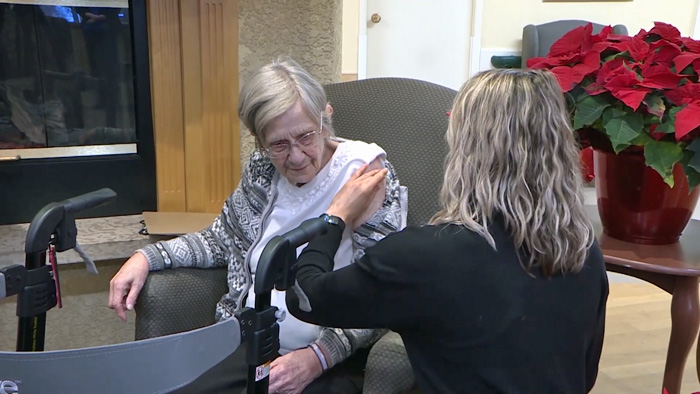View From the Legislature
Vaccinations Begin at Personal Care Homes

On Monday morning at Oakview Place Long Term Care Residence in Winnipeg, 94-year-old Margaret Watson sat down in front of a camera and a select few medical onlookers and became the first person in Manitoba, who is not a healthcare worker, to receive the COVID-19 vaccine. So began a 28-day sprint to try to get every resident of a personal care home their first dose of the COVID-19 vaccine.
While people of many age groups have become sick and died from COVID-19 there is little doubt that it has hit the elderly most severely. Of the 741 Manitobans who have died from the virus as of Monday, almost half had connections to personal care homes.
A Manitoba vaccination steering committee comprised of medical professionals determined early on that when the vaccine became available it should be provided first to healthcare workers who work directly with COVID-19 patients and then to residents of personal care homes. The combined desired effect once the immunizations are complete is to help stabilize the healthcare system as well reduce the impact on the most vulnerable to the pandemic.
A number of constituents have contacted me to ask when there will be more general availability to a COVID-19 vaccine for the public. While Manitoba has now vaccinated more than 10,000 individuals, it has been to the specific class of individuals identified (healthcare workers and PCH residents). With the recent opening of the RBC Convention Centre vaccine super-site, the rate of vaccination can increase significantly. Of course, there are increased complexities to supplying vaccines to remote communities which involve not only distance, but the storage requirements of the vaccine itself. However, the ultimate determination of when general members of the public wishing to take the COVID-19 vaccine will be able to receive it will depend on the supply.
The supply of the vaccine is the responsibility of the federal government on two levels. First, the federal government through Health Canada approves vaccines based on their medical analysis. To date, the COVID-19 vaccines created by Pfizer and Moderna have been approved by Health Canada and hundreds of thousands of Canadians have successfully received their dose. There are other vaccines which are under analysis and if any of them are approved that could increase the speed at which Canadians have access.
Secondly, the federal government is responsible for the contracting with drug companies for the vaccine supply for all of Canada. There are many contracts that have been signed for vaccine supply and provinces and Canadians are relying upon them to increase the supply of vaccines in the weeks and months ahead.
On Monday Margaret Watson expressed her hope that her vaccination will be good for her as well as for others. In perhaps one of the hardest times we have experienced, it is optimism we can all share in.




